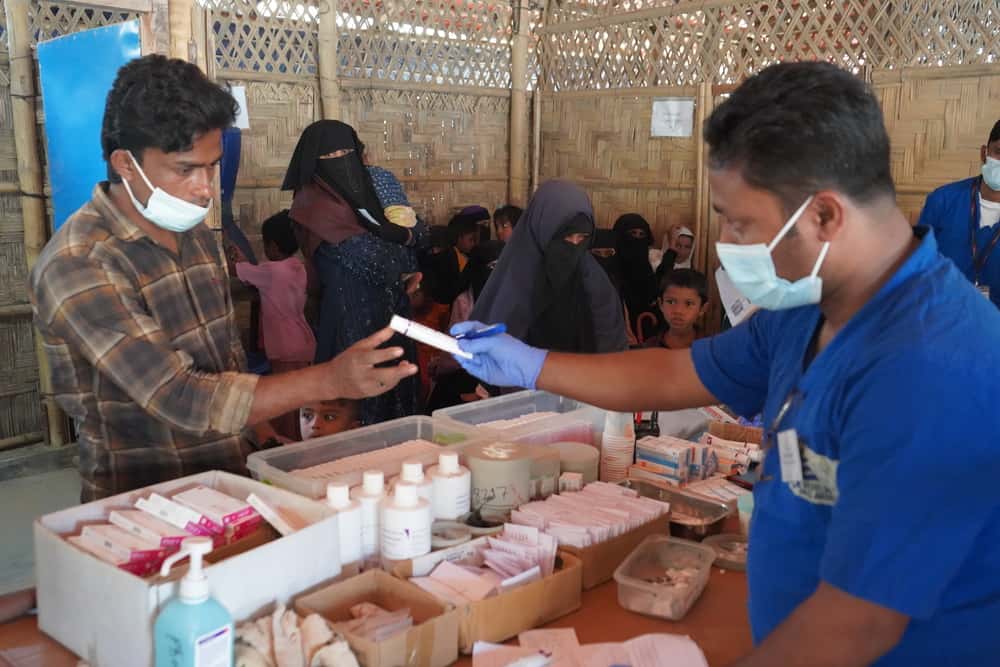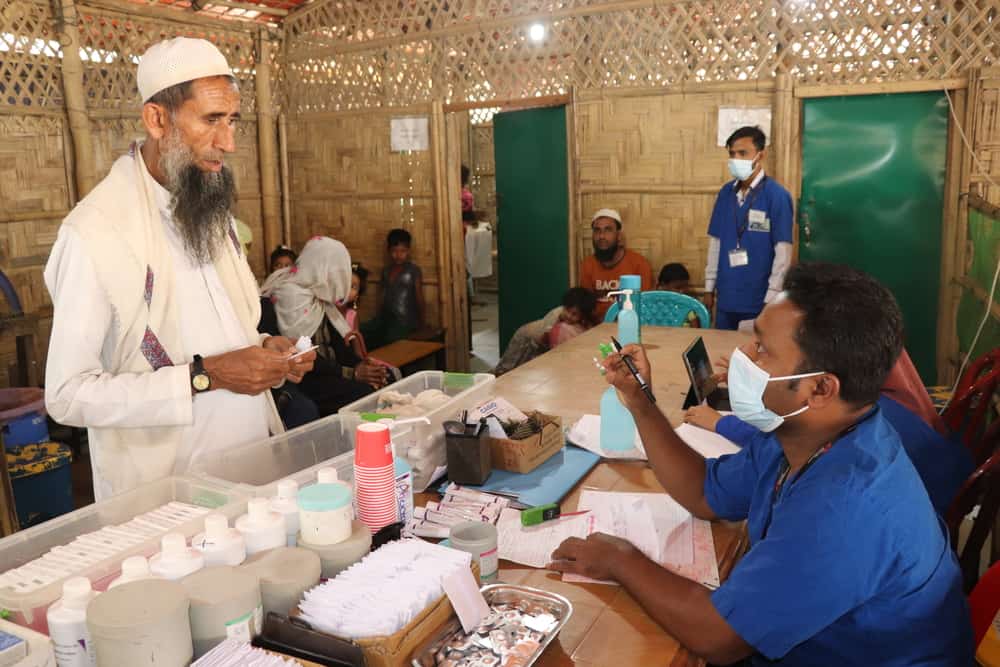MSF teams in the world’s largest refugee camp in Bangladesh are overwhelmed by the ongoing outbreak of scabies and are calling on other health actors to take their responsibility.
Ajmot Ullah is a 26-year-old Rohingya refugee living in the world’s largest refugee camp in Cox’s Bazar, Bangladesh, since 2017.
Rohingya refugees cannot legally work in Bangladesh. To get by, Ajmot relies almost exclusively on humanitarian aid, just like nearly one million other Rohingya refugees in the camps.
Nevertheless, aid alone has never been fully sufficient, “especially when serious illness occurs, because we cannot visit medical facilities outside of the camps on our own, Ajmot says.
Rohingya refugees in Cox’s Bazar have been living in overcrowded camps for almost six years now, with no legal status, no possibility to work, extremely limited education prospects or access to essential services. In the meantime, the COVID-19 pandemic has added even more restrictions and stress to their life.

“It’s not only COVID. In the camps, any kind of outbreak complicates our situation a little more and increases the challenge for our basic survival.”
“My wife had scabies a couple of years ago. She went to an MSF facility, received treatment and ultimately got better. Now my whole family suffers from scabies again. Our four-year-old son has had it since last December. First, he had rashes on his hands, which then spread to his whole body. We spent money on doctors and in local pharmacies nearby. He eventually got better, but scabies hit him again very quickly. He doesn’t sleep much; cries a lot from pain, and his whole body is itching, especially at night. My other two sons are also suffering from scabies now, while my wife and I have scabies symptoms again. It has become a nightmare for my family,” he says.
Increased number of patients with scabies in MSF facilities
For over a year now, MSF and other health organisations present in the camps have been trying to manage the outbreak of scabies. The number of scabies patients has surpassed MSF’s capacity to respond alone. Witnessing a high upsurge of scabies cases, MSF scaled up its treatment for scabies since March 2022 and has since completed around 135,000 scabies-related consultations.
“That is roughly 750 to 800 patients per day, while our daily intake capacity amounts to 600 to 700 maximum,” says Md Kawsar, MSF’s Medical Assistant Supervisor in Jamtoli clinic.

While treating patients with scabies for a year and observing how the numbers fluctuate, with MSF reaching its limits, Jamtoli and Hakimpara facilities were compelled to begin accepting only patients from their primary catchment areas (Camp 14 & 15) from 1 February, 2023.
In MSF facilities, patients come to seek medical advice for scabies and express frustration about not receiving enough care in other facilities. Many patients tell us they are being redirected to MSF facilities.
Difficult living conditions in the camps
The sharp increase in scabies cases is directly linked to the living conditions in the camps, where people share small, cramped spaces and some have inadequate access to water to meet their daily needs.
Hygiene challenges in the camps
Taher (18 year) is a Madrasa (religious educational center) student, who has suffered from scabies for the last one and a half months. He spends most of his time in Madrasa and talks to us about his struggle to maintain good hygiene.
“I know that if we catch scabies, we can’t share clothes and that we need to maintain good hygiene conditions. In Madrasa, we share bedding and one room for six boys. We do not have enough space. I tried my best to maintain hygiene standards, but it is hard. Still, we share bedding; we share clothes, everything. Now we share scabies too,” he says.
Dil Nawas is a 16-year-old visiting MSF’s facility for scabies treatment with her mother. She was infected once last year and re-infected this year. She also shares how challenging it is to maintain decent hygiene in an overcrowded camp setup.
“I know how scabies spreads among people. We need to maintain good hygiene and keep our clothes clean, but it is tough for us due to overcrowded spaces and inadequate water access nearby. We must collect water from faraway places. Although there is a water point nearby, there is not enough water for all of us. Getting water is a daily struggle,” says Dil Nawas.
Toll on mental health – beneficiaries and staff
Ajmot looks tired when visiting the Jamtoli clinic with his family members. They are waiting to meet a doctor. ”As a father, I feel helpless. I don’t have money to see a qualified doctor. We heard about MSF’s free medical services from the people near our camps and came here to seek treatment.”
Ayat and Hamid Noor, his two younger sons (2,5 years and six months old), got scabies from his elder son Abdullah who has been infected for over six months.
“He (Hamid Noor) cries a lot and becomes restless. Hence, I can’t sleep at night. I can’t bear hearing him cry all the time,” Ajmot says.
Others also shared their concern about reinfection and the toll it takes on their mental health.
“I received treatment from different healthcare centers. It gets better with time and medication. It’s been happening to me like this for one year. I began to sleep during the daytime and became very anxious. I was able to meet a doctor at MSF who gave me medicines that helped me a lot. I am not as anxious anymore; I believe I will be fine,” says Dil Nawas.
In MSF’s Jamtoli and Hakimpara facility, six medical assistants work in the dedicated scabies treatment center. MSF has assessed that one Medical Assistant can see 100 patients daily. MSF’s medical team members who are directly in touch with patients witness their sufferings and sorrows. “We cannot provide treatment for all our patients,” says Hafiza Akhter, an MSF Medical Assistant in our Jamtoli facility working with the scabies treatment team.
“We redirect them to their nearby facility. If we could treat them all, we would feel much better. Scabies creates so much mental stress, too – people come from far away. Exhausted mothers with affected babies are desperate about their kids crying constantly. In addition to that and due to movement restrictions, they are stopped at different checkpoints on the way. I feel helpless when I deal with such patients.”
Scabies treatment should be available in primary healthcare centers inside the camps
In challenging economic times and with so many crises vying for the world’s attention, the Rohingya refugee crisis is becoming what we call a “forgotten crisis”. This may make the whole situation even more dire. The response to the Rohingya refugee crisis is fragile, and any additional ‘shock’, such as a decrease in funding, could make the situation even more dire.
The current level of services provided by the different NGOs and agencies working in the response is barely covering the needs as it is. Of particular concern is the seemingly inadequate access to functional health facilities which Rohingya face, as evidenced by the ongoing response to scabies. The skin disease should be managed in any primary healthcare facility, but since an outbreak began in March of last year, we increasingly find patients that are not receiving proper treatment at these clinics, with many coming to our primary healthcare centers, sometimes from great distances. These gaps in basic healthcare are stretching our capacity to the limit.
“These gaps in basic healthcare are stretching our capacity to the limit. We are calling for other health actors to step up their intervention.”












